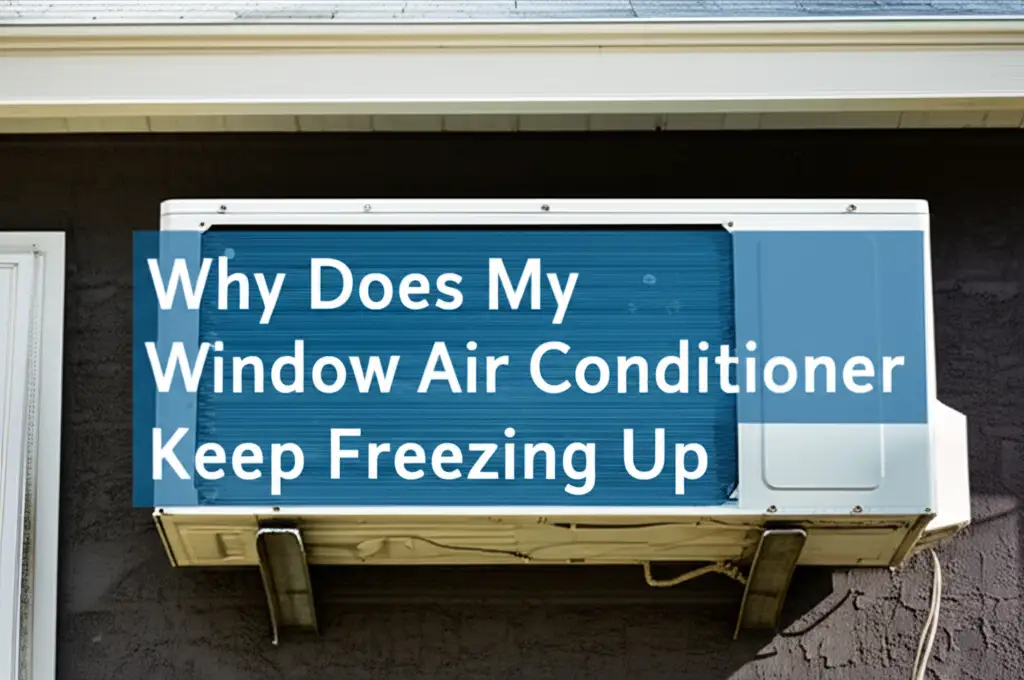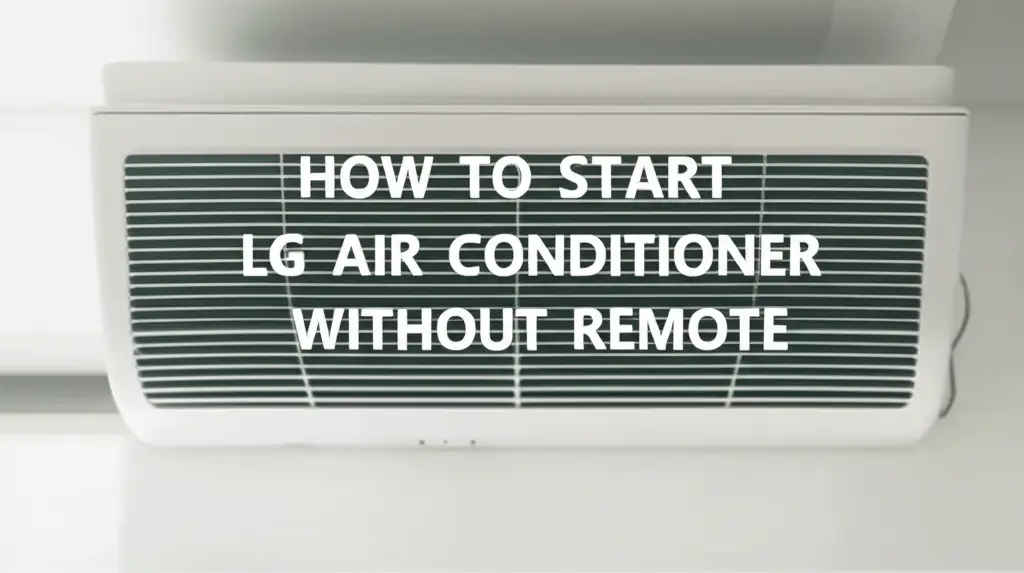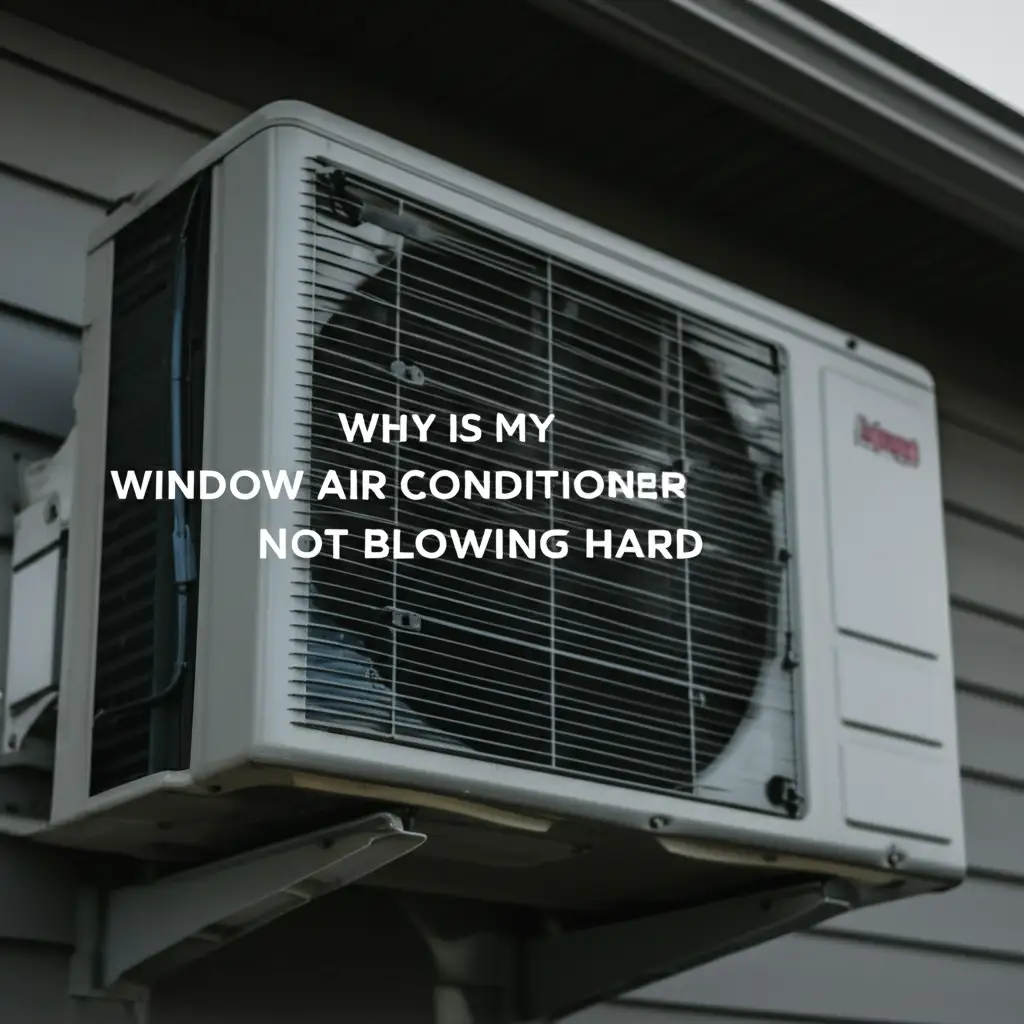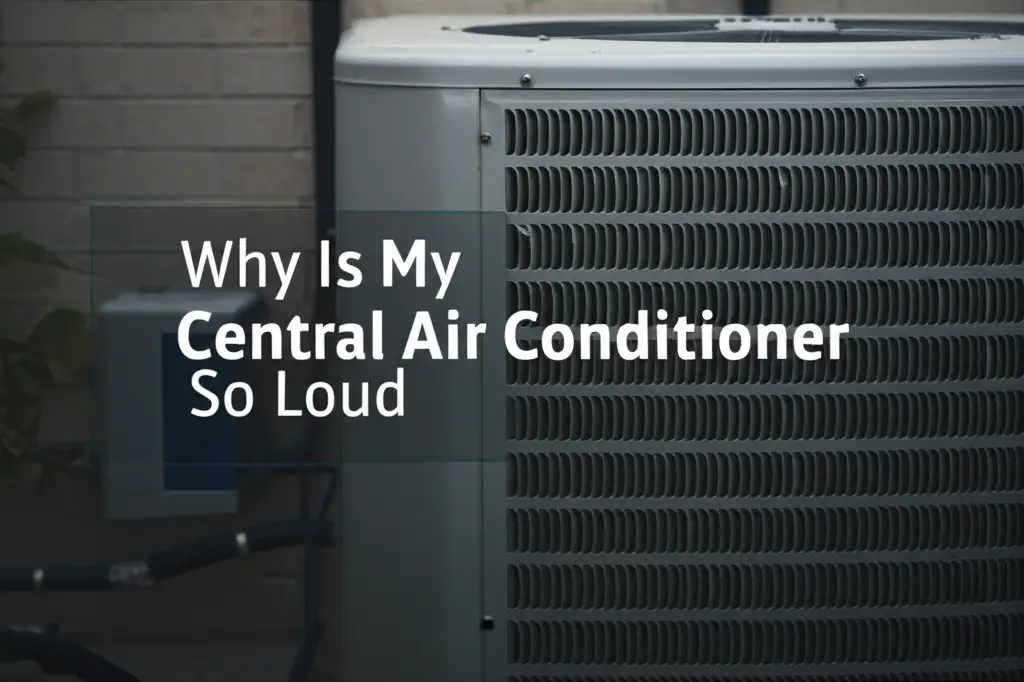· Davia Murnell · Home Appliances · 21 min read
Why Does My Window Air Conditioner Keep Freezing Up

Why Your Window AC Keeps Freezing Up
There is nothing quite like a cold blast from your window air conditioner on a hot summer day. But sometimes, that relief turns into frustration when you notice ice forming on the coils. If your window air conditioner keeps freezing up, it means the system struggles to manage refrigerant temperature or airflow. This issue reduces cooling efficiency and can cause damage to the unit. We will explore the main reasons why a window AC unit freezes and provide clear steps to fix these problems.
A freezing AC unit often signals an underlying issue. It might be simple, like a dirty filter, or more complex, like a refrigerant leak. Understanding these causes helps you take the right action. This article guides you through common culprits behind a frozen window AC. You will learn how to diagnose problems and perform simple maintenance. This knowledge helps you keep your unit running smoothly and efficiently.
Takeaway
A window air conditioner freezes due to issues affecting proper heat exchange and airflow.
- Dirty Air Filter: Restricts airflow, causing the evaporator coil to get too cold.
- Low Refrigerant: Reduces pressure, leading to super-cold coil temperatures.
- Blocked Airflow: Obstructions around the unit or vents limit air circulation.
- Fan Motor Issues: A weak fan fails to move enough air across the coil.
- Thermostat Settings: Running the unit too low in cool ambient conditions.
- Clogged Drain Line: Prevents water removal, leading to ice buildup.
Why does my window air conditioner keep freezing up?
Your window air conditioner keeps freezing up because the evaporator coil gets too cold, dropping below freezing point. This happens when warm air cannot properly flow over the coil or when the refrigerant pressure is too low. Common reasons include a dirty air filter, low refrigerant levels, poor airflow, or fan motor problems.
Restricted Airflow: A Common Cause of AC Freezing
Restricted airflow is one of the most frequent reasons your window air conditioner keeps freezing up. Airflow is crucial for the AC unit to work correctly. The evaporator coil, located inside your house, absorbs heat from the air. This heat is then transferred to the refrigerant. If not enough warm air moves over this coil, the coil gets too cold. The moisture in the air then condenses and freezes on the super-cold surface.
Think of it like a cold drink on a humid day. Water condenses on the outside. If the air around the AC coil is still, the coil’s temperature drops below freezing. This turns condensed water into ice. A common culprit for restricted airflow is a dirty air filter. Your AC filter traps dust, dirt, and pet dander. Over time, this debris builds up and clogs the filter. A clogged filter blocks air from moving freely into the unit.
You should check your air filter regularly, especially during peak cooling season. Most manufacturers recommend checking it every two to four weeks. If it looks dirty, you should clean or replace it. This simple step can prevent many freezing issues. Beyond the filter, furniture or curtains blocking the unit’s vents also restrict airflow. Make sure nothing stands directly in front of the AC’s intake or exhaust vents. An unrestricted unit works best.
Dirty Air Filters: The Primary Culprit
A dirty air filter is arguably the number one reason why a window air conditioner keeps freezing up. The filter’s job is to protect the internal components, especially the evaporator coil, from dust and debris. When the filter becomes clogged with grime, it acts as a barrier to incoming air. This means the amount of air passing over the evaporator coil reduces significantly. Less warm air means the evaporator coil cannot absorb enough heat.
The refrigerant inside the coil continues to expand and cool as it should. But without enough warm air to counteract this cooling effect, the coil’s temperature drops too low. When the coil reaches temperatures below 32 degrees Fahrenheit (0 degrees Celsius), any moisture present in the air instantly turns into ice on the coil surface. This ice buildup then further restricts airflow, creating a vicious cycle. The more ice forms, the less air can pass, which causes more ice to form.
Regular filter maintenance is essential. I make it a point to check my AC filter once a month during summer. If you see a thick layer of dust, it’s time for a clean or replacement. Some filters are washable, while others are disposable. Refer to your AC unit’s manual for specific instructions. By keeping your air filter clean, you ensure adequate airflow. This prevents the evaporator coil from becoming too cold and keeps your window air conditioner running efficiently. You can learn more about general cleaning practices by checking our guide on how to clean air conditioner.
Blocked Vents and Unit Placement
Even with a clean air filter, your window air conditioner can still suffer from restricted airflow. The issue might stem from external blockages or the unit’s placement. The vents on your window AC unit need clear space to draw in and expel air. On the inside, furniture, drapes, or blinds can block the front intake or side vents. If these openings are covered, the unit struggles to pull in enough room air. This causes the same problem as a dirty filter: insufficient warm air reaches the evaporator coil.
Similarly, the outside part of the unit also needs clear space. Debris like leaves, branches, or even overgrown shrubs can obstruct the condenser coils. While the condenser coil is on the outside, a very dirty or blocked condenser can indirectly affect the unit’s overall efficiency. This can place more strain on the system. It may then struggle to dissipate heat effectively, impacting the entire cooling cycle. This increased strain might contribute to the evaporator coil getting too cold.
Always ensure there is ample space around both the indoor and outdoor sections of your window AC unit. Keep drapes and blinds pulled away from the front. Trim any foliage growing near the outdoor portion. Check the external vents for obstructions. Clearing these blockages ensures your unit receives proper ventilation. This helps prevent freezing. It also helps your window AC unit blow cold air effectively. If your unit is not blowing hard enough, it often relates to airflow issues, as discussed in our article why is my window air conditioner not blowing hard.
Low Refrigerant Levels: A Serious Concern
Low refrigerant levels are another major reason why a window air conditioner keeps freezing up. Refrigerant is the substance that absorbs heat from your indoor air and releases it outside. It cycles through the AC system, changing between liquid and gas states. This process is how your AC cools your home. If your unit has low refrigerant, it means there is a leak somewhere in the sealed system. Refrigerant does not get used up like gasoline; it should last the lifetime of the unit.
When refrigerant levels drop, the pressure within the evaporator coil decreases significantly. This low pressure causes the refrigerant to get much colder than it should be. The coil itself becomes excessively cold. Any moisture in the air passing over this super-cold coil will freeze instantly. This creates a layer of ice that builds up over time. This ice buildup further hinders the unit’s ability to absorb heat, worsening the problem.
Identifying a refrigerant leak can be tricky. You might notice your unit is not cooling as effectively as it used to. Sometimes, you might even hear a hissing sound, but this is rare in smaller leaks. Low refrigerant is a serious issue that you cannot fix yourself. Adding more refrigerant without finding and fixing the leak is only a temporary solution. It will simply leak out again. If you suspect low refrigerant, it is best to call a qualified HVAC technician. They have the tools to detect leaks, repair them, and then properly recharge the system. A technician can ensure your window AC unit cools properly and safely. If your AC is not as cold as it used to be, low refrigerant could be a reason. You can learn more here: why is my window air conditioner not as cold as it used to be.
Fan Motor Issues: Weak Air Circulation
The fan motor plays a vital role in your window air conditioner’s operation. It powers the fan that blows air over the evaporator coil. This moves cold air into your room. It also powers the fan that expels hot air from the condenser coil outside. If the fan motor is weak or failing, it cannot move enough air. This leads to reduced airflow over the evaporator coil. As we have discussed, insufficient airflow is a direct cause of freezing.
A fan motor can weaken due to old age, dirt buildup, or worn bearings. You might notice the fan running slower than usual. The sound of the fan might also change, perhaps becoming louder or making grinding noises. If the fan blades themselves are dirty or damaged, they also cannot move air efficiently. This creates a similar problem, causing the coil to drop to freezing temperatures. When the coil gets too cold, moisture in the air freezes on its surface.
Checking the fan motor for issues requires some caution. Always unplug the unit before attempting to inspect any internal parts. Look at the fan blades to see if they are visibly dirty or bent. You can gently clean them if accessible. If the fan motor hums but the fan does not spin, or if it spins very slowly, the motor likely has a problem. This might require a professional repair or replacement of the motor. A failing fan motor can lead to an inefficient AC unit. It can also cause the AC to stop working altogether. Sometimes, a freezing unit due to a bad fan motor can cause the unit to shut off by itself. We have a guide on why does my window air conditioner turn off by itself for more details.
Environmental Factors and Settings
Sometimes, your window air conditioner keeps freezing up due to factors beyond mechanical failure. Environmental conditions or incorrect settings can contribute to the problem. These are often easier to adjust than internal repairs. Understanding these factors can help prevent unnecessary service calls.
One common issue is running the AC unit at too low a temperature setting when the outside air is already cool. Air conditioners are designed to remove heat and humidity. If the ambient temperature is already low, say below 65-70 degrees Fahrenheit (18-21 degrees Celsius), and you set your AC to a very low temperature, the evaporator coil may drop below freezing point. There is not enough heat to absorb from the already cool air. This causes moisture to freeze on the coil. It is best to avoid running your AC when outside temperatures are very mild.
High humidity also plays a role. Air conditioners remove moisture from the air as part of the cooling process. If your home has extremely high humidity, the evaporator coil has to work harder. It condenses a lot of water vapor. If other factors like restricted airflow are present, this excess moisture can quickly turn into ice on the coil. Ensure your AC is properly sized for your room. An oversized unit may cool the room too quickly without adequately removing humidity. This leads to short cycling and potential freezing issues. Proper sizing helps manage humidity.
Thermostat Settings and Cold Weather Operation
Improper thermostat settings are a common, yet often overlooked, reason why your window air conditioner keeps freezing up. Setting the thermostat too low, especially during cooler periods, can cause the evaporator coil to get excessively cold. AC units are designed to remove heat from the air. When the room temperature is already cool, there is less heat for the refrigerant to absorb. This leads to the coil dropping below 32°F (0°C).
For example, if the outside temperature is 70°F (21°C) and you set your AC to 60°F (15°C), the unit struggles to find enough heat to transfer. The evaporator coil, doing its job to chill the refrigerant, becomes much colder than usual. This causes any humidity in the air to freeze on its surface. Ice then builds up, further hindering efficient operation.
It is generally not advisable to run your window AC unit when outside temperatures are below 65°F (18°C). Many units have a minimum operating temperature. Below this temperature, the unit is not designed to operate effectively and is prone to freezing. Always refer to your AC unit’s manual for recommended operating temperatures. Adjust your thermostat to a reasonable temperature, usually around 72-78°F (22-26°C) for optimal cooling and efficiency. If your unit has an “auto” fan setting, use it. This allows the fan to cycle on and off with the compressor, preventing continuous fan operation over an already cold coil in mild temperatures.
High Humidity and Condensation Issues
High humidity in your home can significantly contribute to your window air conditioner freezing up. An AC unit does two main jobs: it cools the air and it dehumidifies it. When warm, humid air passes over the cold evaporator coil, moisture condenses out of the air onto the coil surface. This is a normal part of the cooling process. However, if the humidity levels are excessively high, or if other issues like restricted airflow are present, the amount of condensed water can become too much.
When the evaporator coil is already super cold due to another issue (like a dirty filter or low refrigerant), this abundant condensed water freezes almost immediately. The ice buildup then starts. This makes the problem worse. The ice acts as an insulator, preventing the coil from absorbing heat effectively. This further drops the coil temperature, causing more ice to form. It creates a cycle that leads to a completely frozen evaporator coil.
You might notice your window air conditioner leaking water from the front when it is experiencing freezing issues. This often happens after the unit has been off for a while and the ice melts. The water overflows the drain pan. This is a clear sign of freezing. We have a dedicated article explaining why is my window air conditioner leaking water from the front. Using a dehumidifier in very humid climates can help reduce the load on your AC. Ensure your AC unit is properly sized for your room. An oversized unit might cool the room too quickly without enough dehumidification, leading to short cycles and higher humidity.
Clogged Drain Line: Preventing Water Removal
A clogged drain line can indirectly cause your window air conditioner to freeze up, though it is more commonly associated with water leaks. However, a severe clog can contribute to ice formation. When your AC unit cools the air, it also removes humidity. This moisture condenses on the evaporator coil and collects in a drain pan. From there, it usually drains outside through a small line or drips directly from the unit’s rear.
If the drain line or the drain pan itself becomes clogged with algae, mold, dirt, or debris, the water cannot escape. The drain pan overflows. If the water level in the pan rises high enough, it can come into contact with the bottom of the evaporator coil. If the coil is already operating at very low temperatures (due to other issues like restricted airflow or low refrigerant), this standing water in the pan can then freeze onto the bottom of the coil.
This ice buildup often starts at the bottom of the coil and spreads upwards. It adds to any existing freezing problem. It also causes significant water damage inside your home if the unit is not properly draining. Regularly inspecting and cleaning the drain pan and line can prevent this issue. Many window AC units have a drain plug or a small opening on the back for drainage. Keeping these clear ensures proper water removal. If you notice a musty smell, it could be mold forming due to standing water. You can learn about cleaning mold from window AC components in our article how to clean mold from window air conditioner.
Troubleshooting and Fixing a Frozen AC
When your window air conditioner keeps freezing up, the first step is to turn it off. Do not try to chip away the ice; this can damage the coils. Let the unit completely defrost. This can take several hours, or even a full day, depending on the amount of ice. You can speed up the defrosting process by setting the fan to its highest speed while the compressor is off, but only if your unit has a “fan only” mode. Otherwise, just turn it off.
Once the unit is fully defrosted, you can begin troubleshooting. Start with the easiest and most common issues. Check the air filter first. If it is dirty, clean or replace it. This is often the quickest fix. Next, ensure there are no obstructions around the unit’s vents, both inside and outside. Move any furniture or drapes that block airflow. Clear away leaves or debris from the outdoor section.
If these simple steps do not solve the problem, or if the unit freezes again quickly, the issue might be more complex. A low refrigerant level or a failing fan motor requires professional attention. Do not attempt to add refrigerant yourself. This requires special tools and knowledge. A technician can accurately diagnose refrigerant leaks or motor issues and perform the necessary repairs. Regular maintenance, including cleaning coils and filters, can prevent many of these freezing problems.
Defrosting Your Window AC Unit Safely
Defrosting your window air conditioner safely is the most important first step when you discover ice. Never try to chip away at the ice with sharp objects. This can easily puncture the delicate refrigerant coils or damage other internal components. A puncture will lead to a costly refrigerant leak and a major repair. Patience is key when dealing with a frozen AC.
The safest way to defrost your unit is to simply turn it off. Unplug the unit from the wall outlet to ensure no power goes to the compressor. Then, allow the ice to melt naturally. This process can take several hours, depending on how much ice has accumulated and the ambient room temperature. Placing a towel or shallow pan under the unit can catch any melting water, especially if your unit tends to leak water when defrosting.
Some units have a “fan only” setting. If your unit has this option, you can switch it to fan-only mode with the compressor off. The fan will circulate room air over the frozen coil, speeding up the melting process. However, if your unit does not have this setting, just turning it off completely is sufficient. Once all the ice has melted, you can then begin troubleshooting the cause of the freezing. Make sure the unit is completely dry before turning it back on.
Regular Maintenance for Prevention
Regular maintenance is the best defense against your window air conditioner freezing up. Proactive care can save you from inconvenient breakdowns and costly repairs. The most important maintenance task is regularly cleaning or replacing the air filter. I recommend checking the filter at least once a month during peak cooling season. A clean filter ensures good airflow, which prevents the evaporator coil from getting too cold.
Beyond the filter, keep the coils clean. The evaporator coil (inside) and condenser coil (outside) can accumulate dirt and debris. Dust on the evaporator coil acts as an insulator, reducing its ability to absorb heat efficiently. Dirt on the condenser coil (the outdoor coil) hinders heat dissipation. Both scenarios can lead to the system working harder and potentially freezing. You can use a soft brush and a coil cleaner (available at hardware stores) to gently clean the coils. Always unplug the unit first.
Also, check the drain pan and drain line for clogs. Algae and mold can grow in these areas, blocking water flow. Use a stiff wire or a small brush to clear any obstructions in the drain line. Pouring a small amount of diluted bleach solution (check your manual first) can help prevent future mold growth. Finally, ensure the area around your unit is clear of obstructions. This includes drapes, furniture, or outdoor foliage. Regular cleaning and attention to proper airflow will significantly extend the life of your unit and prevent frustrating freezing issues.
When to Call a Professional
While many reasons for a window air conditioner freezing up can be fixed with DIY methods, some issues require a professional. Knowing when to call an HVAC technician can save you time, money, and potential further damage to your unit. If you have cleaned the filter, ensured clear airflow, and still find your unit freezing repeatedly, it is time for expert help.
The most common complex issue causing freezing is a low refrigerant level. Refrigerant leaks are difficult to diagnose and repair without specialized equipment. An HVAC technician can use leak detectors to pinpoint the exact location of the leak. They can then properly repair it and recharge the system with the correct amount of refrigerant. Attempting to add refrigerant yourself can be dangerous and ineffective. It can also cause more damage to the unit.
Another reason to call a pro is if you suspect a faulty fan motor or compressor. These are major components. Their replacement requires specific tools and expertise. Signs of these issues include unusual noises, a fan that spins slowly or not at all, or the unit simply not cooling despite running. If your window AC unit keeps tripping its breaker or blowing fuses, this could also indicate a serious electrical or component issue that warrants professional inspection. You can learn more about these issues here: why does my window air conditioner keep tripping the breaker. A professional can diagnose the root cause and provide a lasting solution, ensuring your window air conditioner runs safely and efficiently.
FAQ Section
Q1: How long does it take for a window AC to defrost?
A1: Defrosting a window AC unit can take anywhere from a few hours to a full day. The exact time depends on the amount of ice and the ambient temperature in the room. You should always turn the unit off and let the ice melt naturally. Do not try to chip the ice away.
Q2: Can a dirty AC filter cause a unit to freeze?
A2: Yes, a dirty AC filter is a very common cause of a window air conditioner freezing up. A clogged filter restricts airflow over the evaporator coil. This causes the coil to get too cold, leading to ice buildup from condensed moisture in the air.
Q3: Is it bad if my AC unit freezes up regularly?
A3: Yes, regular freezing is bad for your AC unit. It reduces cooling efficiency and can put strain on the compressor. Persistent freezing can lead to premature component failure and costly repairs. It is important to address the underlying cause promptly.
Q4: What does a frozen AC coil look like?
A4: A frozen AC coil looks like it is covered in a layer of ice or frost. This ice can be thin and flaky or thick and solid, completely encasing the evaporator coil fins. You might see ice not only on the coil but also on the refrigerant lines entering and exiting the unit.
Q5: Can I run my window AC in cold weather?
A5: You should generally avoid running your window AC unit when outside temperatures are below 65-70 degrees Fahrenheit (18-21 degrees Celsius). ACs are designed to remove heat, and in cold weather, the evaporator coil can drop below freezing, causing it to ice up.
Q6: Does low refrigerant always mean a leak?
A6: Yes, if your window air conditioner has low refrigerant, it almost always means there is a leak somewhere in the sealed system. Refrigerant does not get consumed during operation. It circulates in a closed loop. Any reduction in its level indicates a breach in the system.
Conclusion
Understanding why your window air conditioner keeps freezing up helps you maintain your comfort. We have covered the main culprits, from dirty air filters and restricted airflow to low refrigerant and fan motor issues. We also discussed how thermostat settings and high humidity play a role. The most common solutions often involve simple tasks like cleaning your air filter and ensuring proper airflow around the unit.
Remember, the first step is always to safely defrost your unit by turning it off and letting the ice melt. After defrosting, tackle the common causes. Regular cleaning and attention to your unit’s surroundings can prevent many freezing incidents. For more complex issues like refrigerant leaks or faulty components, calling a certified HVAC technician is the safest and most effective path. By taking proactive steps, you can ensure your window air conditioner provides reliable, efficient cooling for many summers to come.
- Window AC Freezing
- AC Troubleshooting
- Air Conditioner Maintenance
- Frozen AC Coil
- AC Repair





